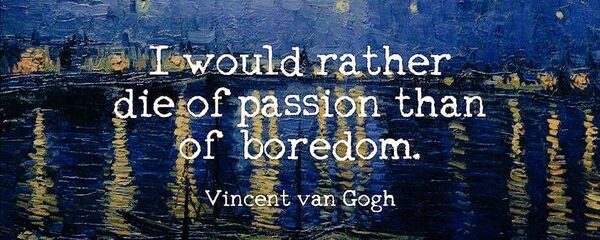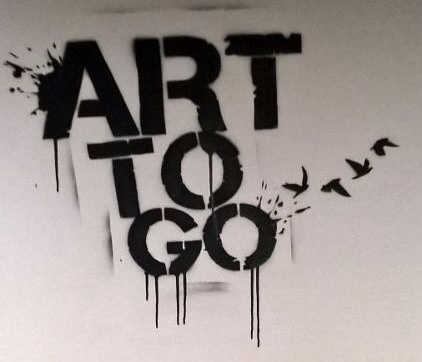
A ciência descreve as coisas como são. A arte, como são sentidas. Como se sente que são. Fernando Pessoa
Van Gogh
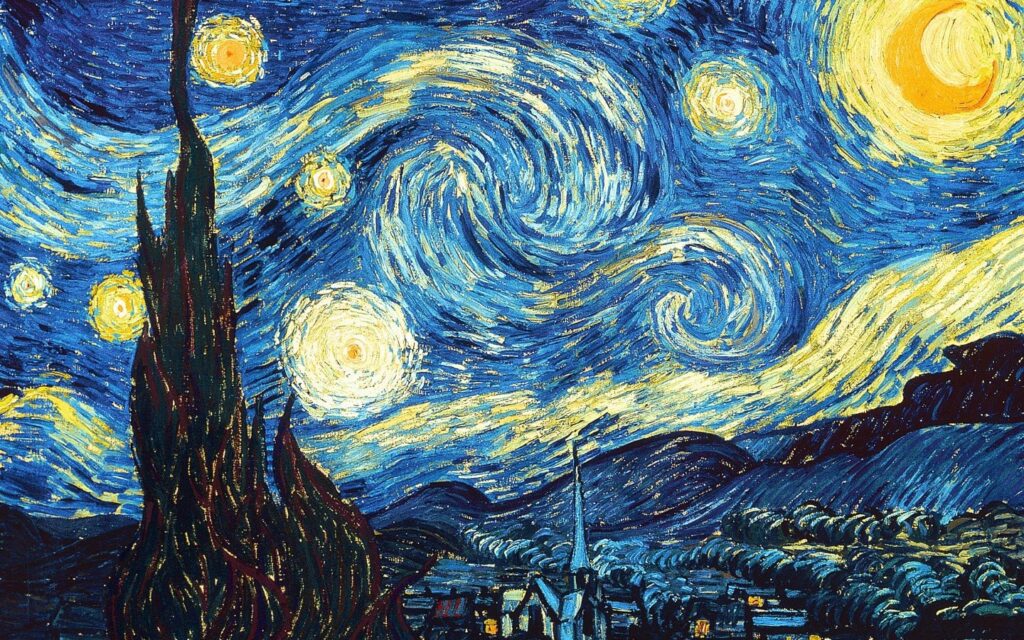
Starry Night depicts a dreamy interpretation of the artist’s asylum room’s sweeping view of Saint-Rémy-de-Provence. Though Van Gogh revisited this scene in his work on several occasions, “Starry Night” is the only nocturnal study of the view. “Through the iron-barred window I can make out a square of wheat in an enclosure,” he wrote in May of 1889, “above which in the morning I see the sun rise in its glory.”
An end-of-the-world cataclysm invades Van Gogh’s Starry Night, one of apocalypse filled with melting aerolites and comets adrift. One has the impression that the artist has expelled his inner conflict onto a canvas. Everything here is brewed in a huge cosmic fusion. The sole exception is the village in the foreground with its architectural elements. Several months after painting Starry Night, Van Gogh wrote: “Why, I say to myself, should the spots of light in the firmament be less accessible to us than the black spots on the map of France?… Just as we take the train to go to Tarascon or Rouen, we take death to go to a star.”

I often think that the night is more alive and more richly colored than the day. Van Gogh 
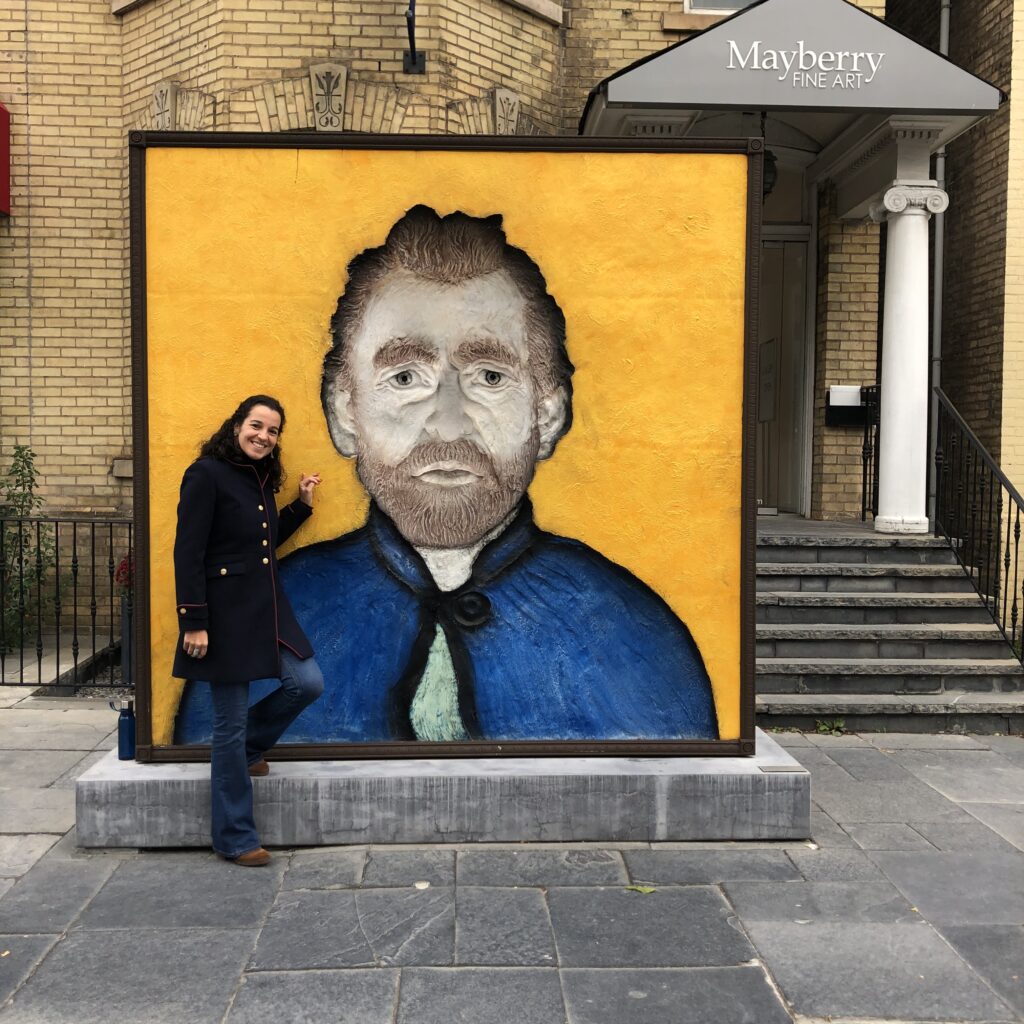
“I was interrupted precisely by the work that a new painting of the outside of a café in the evening has been giving me these past few days. On the terrace, there are little figures of people drinking. A huge yellow lantern lights the terrace, the façade, the pavement, and even projects light over the cobblestones of the street, which takes on a violet-pink tinge. The gables of the houses on a street that leads away under the blue sky studded with stars are dark blue or violet, with a green tree. Now there’s a painting of night without black. With nothing but beautiful blue, violet and green, and in these surroundings the lighted square is coloured pale sulphur, lemon green. I enormously enjoy painting on the spot at night. In the past they used to draw, and paint the picture from the drawing in the daytime. But I find that it suits me to paint the thing straightaway. It’s quite true that I may take a blue for a green in the dark, a blue lilac for a pink lilac, since you can’t make out the nature of the tone clearly. But it’s the only way of getting away from the conventional black night with a poor, pallid and whitish light, while in fact a mere candle by itself gives us the richest yellows and oranges”. Van Gogh
Hundertwasser


“Nature, art, creation are a unity” 
“The straight line leads to the downfall of humanity”
Gustav Klimt

While many talk about the symbol of unity in Gustav Klimt’ The Tree of Life, there are others that consider it an expression of masculine and feminine. The feminine expressed in the painting symbolizes sustenance, care and growth, while the masculine is expressed through the use of phallic representations. From this different union, life is born, and the tree of life, as well. Others say that the painting symbolizes the union between man’s greatest virtues, which are strength, wisdom and beauty. The tree reaching for the sky is a symbol of man’s perpetual yearning for becoming more, yet his roots are still bound to the earth.
One of the important qualities of The Tree of Life is that it challenges the viewer to spend more time admiring the painting, while gauging all its meanings. While the artist uses a richness of symbols, gold for paint and other luxurious techniques to illustrate a magical world, the presence of a single black bird draws the viewer towards the central part of the painting. The black bird is a reminder that everything that has a beginning also has an end, as black birds have been used as a symbol of death by many cultures.
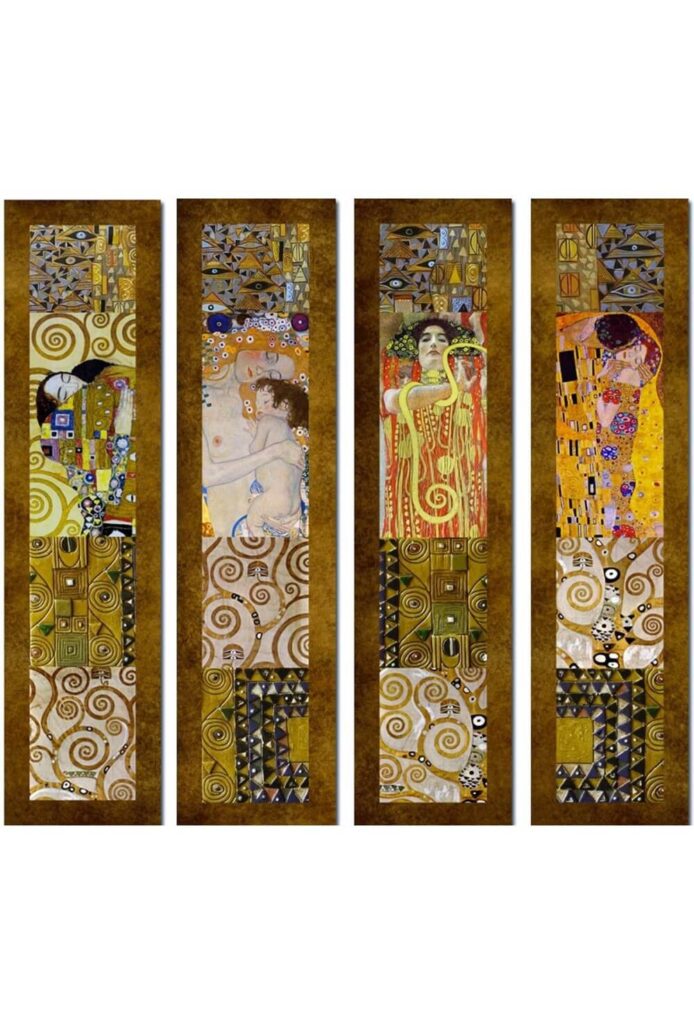
Whoever wants to know something about me – as an artist which alone is significant – they should look attentively at my pictures and there seek to recognize what I am and what I want.
Makhintosh

Art is the Flower – Life is the Green Leaf. Let every artist strive to make his flower a beautiful living thing, something that will convince the world that there may be, there are, things more precious more beautiful – more lasting than life itself. (Charles Rennie Mackintosh)
Keith Harring
“Nothing is important…so everything is important.”
“Art should be something that liberates your soul, provokes the imagination and encourages people to go further.”
Picasso
He can who thinks he can, and he can’t who thinks he can’t. This is an inexorable, indisputable law. Every positive value has its price in negative terms… the genius of Einstein leads to Hiroshima. Every act of creation is first an act of destruction. ” The purpose of art is washing the dust of daily life off our souls.” It takes a long time to become young.”
Margarida Maria
The Infanta Margarita Maria was the daughter of King Philip IV and Marianna of Austria. When Velázquez painted Las Meninas, she was five years-old and heir to the throne of Spain.
“If someone want to copy Las Meninas, entirely in good faith, for example, upon reaching a certain point and if that one was me, I would say..what if you put them a little more to the right or left? I’ll try to do it my way, forgetting about Velázquez. The test would surely bring me to modify or change the light because of having changed the position of a character. So, little by little, that would be a detestable Meninas for a traditional painter, but would be my Meninas”. Picasso
Amadeu Sousa Cardoso
A arte, tal como eu a sinto, é o produto emocional da natureza, fonte de vida, de sensibilidade, de cor, de profundidade, de ação mental e poder emotivo”.
Paul Klee
Art does not reproduce what we see. It makes us see.

Kandinsky
The more frightening the world becomes… the more art becomes abstract. (Wassily Kandinsky)
The more abstract is form, the more clear and direct it´s appeal.
Nadir Afonso
O homem volta-se para a geometria como as plantas se voltam para o sol: é a mesma necessidade de clareza e todas as culturas foram iluminadas pela geometria, cujas formas despertam no espírito um sentimento de exactidão e de evidência absoluta.
Miró
To gain freedom is to gain simplicity. Miró
Raffaello
In this secular age, the cherubs – removed from their Christian origins – now register in a way that Madonnas, Christ Childs and overtly religious figures do not. In one sense, they became icons for the late twentieth-century age of apathy and ennui. Intended by Raphael as a highly human foil to his divine scene above, they offer us, in short, both a classy Renaissance veneer and a thoroughly modern sensibility.
